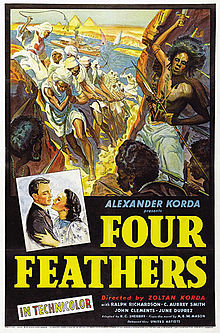
THE FOUR FEATHERS
UK, 1939, 130 minutes, Colour.
John Clements, Ralph Richardson, C. Aubrey Smith, June Duprez, Jack Allen, Donald Gray, John Laurie.
Directed by Zoltan Korda.
The Four Feathers is based on a popular story by A. E. W. Mason, author of The Drum (also filmed by the Kordas in the late 1930s). The story has been filmed several times and there are many empire variations on it. This is the most striking version. It was remade in the mid-50s in Cinemascope by Zoltan Korda as Storm Ov er the Nile. There was a further remake, with a more pacifist tone, in the late '70s, directed by Don Sharp.
Sir Alexander Korda gave lavish attention to this adventure production. It has all the excellent ingredients of the high class matinee material of the time. The atmosphere of empire is re-created, there is an excellent cast, there is location photography in Africa and the use of a cast of thousands. There is a great deal of stiff upper lip in the best British tradition of 19th century heroism. The film reminds us of the beliefs of empire of the past - which contrast very much with the attitudes of the late 20th century. There is an effective cast with Sir John Clements and Sir Ralph Richardson in the lead. Sir C. Aubrey Smith has some good moments as a pompous General. Korda at this time was making a number of excellent film including Jungle Book, The Thief of Baghdad, as well as vehicles for Laurence Olivier, Vivien Leigh, Merle Oberon.
1. The film as the classic 30s adventure from Britain? Its impact in its time? Its evocation of the 19th. century and empire? The stiff upper lip British heroic style? The comparison with the remakes?
2. The values of Alexander Korda’s production? The re-creation of period, the location photography in Africa, the action sequences? Use of colour? The Miklos Rosza score? The evocation of empire?
3. The basic ingredients of the British adventure plot: the Victorian era, military prowess and empire, memories and glorification of memories, especially the Crimea (and inaccurate memories)? Standards of valour and honour, expectations and pressures? Romance versus honour? The public school atmosphere of bravery? The dedicated young men of the time? The hero and his dedication, the accusation of cowardice, his achieving greater feats of bravery than his peers? Coincidences and heroism? The establishing of valour standards of the 19th. century? The impact of this kind of material in later decades?
4. The prologue and the General with his memories of Crimea, his humour with the pineapple? Faversharn and his pressures on his son? Harry as an impressionable young boy reacting against the militarism? The background to Harry's decisions for opting out of the army, making his way in the world. proposal to Ethne? His background of withdrawing from the military talk and this shaping his motives and reactions?
5. The film sketching in the background of British involvement in Africa? The Sudan, the death of Gordon and Khartoum, English reinforcements, the role of the Mahdi? English involvement, skills and diplomacy, vanity of empire? The characters of the film illustrating these English attitudes?
6. The portrait of the group - their particular styles, military dedication, upper class pride, preparations to go to war? The contrast with Harry's behaviour, his resignation and his superior officer's reaction, information to the group? The build-up to the ball? The atmosphere of mobilisation and Harry's remaining at home? The four feathers - including Ethne's?
7. The impact on Harry and his decision to go to Egypt? His training and disguise as a local African? The ingenuity of his disguise as a mute? His experience of being branded? His presence in the Mahdi's troops? His freedom of movement and gathering of information? The danger of his experiences? His instructions to the lawyer to wait a year before informing Ethne?
8. John and his love for Ethne? The tension between his love and Harry's for her? John and his role in Africa, command, the expedition and his being sunstruck, blinded? His pretending not to be blind and participating in the battle? His being left alone, his being rescued by the unknown African? The perils of the journey? Harry's placing the feather in John's wallet and his being accused of robbery? John's return to England, his talk at the dinner table? The others knowing that it was Harry who had rescued him? John and Ethne and their marriage? Ethne's motives? John and his despair about his eyes? His discovering the reality of Harry's helping him? His decision to go to Europe for treatment and do the right thing for Ethne and Harry?
9. The other two companions and their prison experience, torture, Harry's being in prison with them, his torture, revelation of himself, organising the escape, the battle and his heroism?
10. The cinematic presentation of the African battle scenes, their sweep, violence, death, military glory?
11. How satisfying was the romantic ending? Harry maintaining his honour as well as achieving more than he would have had he enlisted? The humorous ending with the General still illustrating Crimea with the pineapple?
12. Themes of empire, belief in British supremacy, British heroism? The age old material of heroic legends?